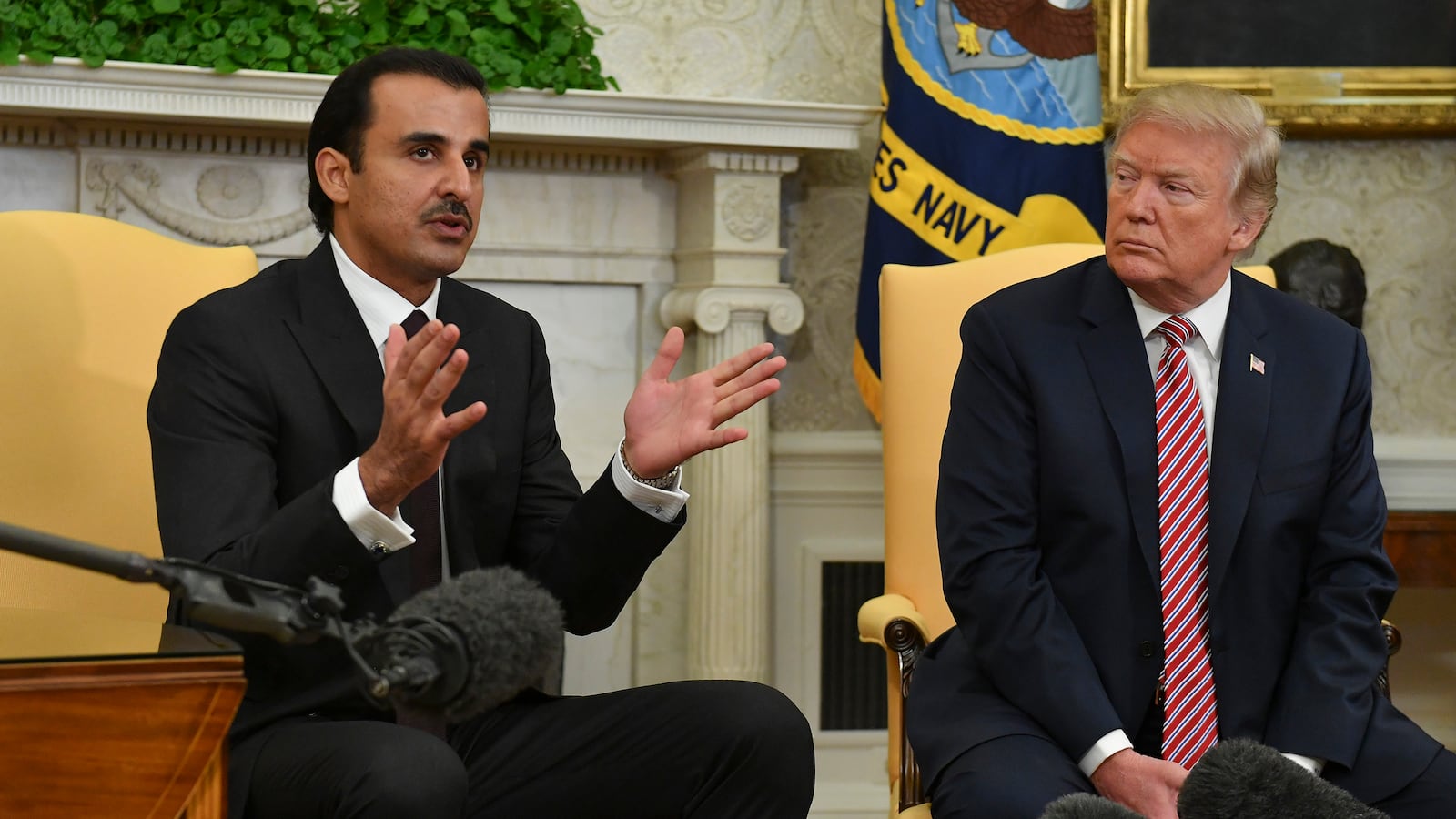Two years ago, Qatar was out in the cold—shunned by a new administration in Washington and the subject of an economic blockade by its neighbors.
But now Doha sees an opening. Particularly in the last six months, Qatar has enlisted and deployed officials across the world as part of a public relations campaign to mold a new image with a focus on underlining to Washington the country’s geostrategic value and economic might, according to two U.S. officials and three other individuals with knowledge of Qatar’s efforts. Since the beginning of 2017, Qatar has spent at least $24 million on U.S. lobbying efforts, according to the Center for Responsive Politics.
“Qatar remains very isolated in the Arab Gulf region until now,” said Hussein Ibish, a senior resident scholar at the Arab Gulf States Institute in Washington, “They’ve found a set of functional work-arounds that allow the country to endure, with some costs, but until something bigger changes, like a conflict with Iran, other major regional unrest, or a new U.S. policy, the isolation will continue.”
Tamim bin Hamad Al-Thani, who visited the White House last spring, is set to return to the U.S. on Tuesday to meet with President Trump, who in 2017 accused Qatar of funding terrorism and threatening the region in part because of its alliance with Iran. The emir’s visit comes as Washington is in the midst of trying to manage an increasingly volatile relationship with Tehran.
“We have… offered to act as an independent and impartial mediator should Iran and the U.S. decide to come to the table for discussions,” said Jassim Bin Mansour Al-Thani, media attaché for the state of Qatar in the United States, adding that Tamim would meet with members of the administration, lawmakers, and business executives during his trip.
“Qatar’s political and economic partnership [with the U.S.] has endured for decades,” Al-Thani said. “As His Highness stated last year, Qatar is committed to doubling the U.S.-Qatar economic partnership to $250 billion.”
The White House and the State Department did not respond to a request for comment for this story.
But a senior administration said: "We welcome actions demonstrating that Qatar understands partnership with the United States—not Iran—is their best path to a prosperous and secure future."
Qatar’s public relations campaign has taken different forms. Earlier this month, officials from Qatar spent nearly three weeks between Washington and New York meeting with U.S. officials, think tank scholars, and academics, setting the stage for the emir’s visit on Tuesday. Topics of those conversations included the White House’s response to Iran, the ongoing war in Yemen, and Jared Kushner’s Middle East peace plan, according to three people with direct knowledge of those talks.
Qatar took part in a conference in Bahrain last month where the U.S. unveiled part of its peace plan, such as it was. The conference was originally supposed to bring all parties, including the Palestinians and Israelis, to the table to talk about economic investment in the region. But the Palestinians boycotted, and some of the panelists who spoke about the topic did not seem to have prior knowledge of the region. Kevin Hassett, the former top economist for the Trump administration who is known for his tax policy work, spoke at the conference about property rights in Palestine.
“Mr. Kushner in the most recent workshop in Manama acknowledged that no economic plan can be conducive to a lasting peace without a holistic political solution, and we agree with this assessment,” Al-Thani, the media attaché, said. “We have also expressed our concern that without the Palestinians onboard it becomes impossible to reach any meaningful solution. Qatar… remains committed to the economic resilience and prosperity of the Palestinian people.
U.S. officials who took part in the planning and policies associated with the conference told The Daily Beast that the Trump administration hailed the event as a success because Qatar attended, alongside those countries that had organized the blockade, as well as with Israel.
“That in and of itself is a big win,” one senior U.S. official said. “Just having all these countries in the same room and having Qatar have a seat at the table is something. And the U.S. made that happen.”
Meanwhile, lobbyists from Debevoise & Plimpton have been working on behalf of Qatar. Representatives of the firm reportedly met with National Security Adviser John Bolton before he departed on a trip to the Middle East, according to a Department of Justice filing first reported by Politico.
Qatar has also employed a slew of advertisements in the U.S., one of the latest in Politico’s Playbook.
One of the ads read: “President Trump’s then Secretary of State on Qatar: ‘We are grateful to Qatar for the longstanding support of America present and continuing commitment to regional security, a commitment that includes information sharing and counterterrorism training.’”
In South Carolina, Qatari Armed Forces are finalizing plans to invest in the development of surveillance aircraft, according to company documents and two sources with knowledge of the project’s timeline.
Doha’s officials have visited South Carolina, where the Qatari-owned firm Barzan Aeronautical is registered, to meet with state and local officials, as well as Sen. Lindsey Graham (R-SC), to promote the idea of investment and to garner support for the project.
The aircraft investment is part of Qatar’s campaign to double down on its alliance with the U.S. It comes in tandem with a push by the country to invest massive amounts of cash into the U.S. in various sectors, including real estate and technology. The leader of the country’s sovereign wealth fund said earlier this year that the Qatar Investment Authority planned to increase its investments in the U.S. to $45 billion over the next two years.
Tamim’s visit could mark a turning point for U.S.-Qatar relations.
Investment will likely be a main topic of conversation between Tamim, his staff, and U.S. officials, including Trump, people familiar with the planning for the visit said. Arms sales will also be on the agenda. Before Tamim’s visit to Washington last spring, the U.S. approved a large purchase of weapons systems by Doha. Last month, the Senate failed to block arms sales to Qatar in a 42-57 vote.
Two individuals familiar with Tamim’s schedule in Washington said the Qataris are also looking to speak with U.S. officials about counterterrorism and defense issues, including the expansion of the al-Udeid Air Base near Doha and the mutual strategy of opposing Libyan strongman Khalifa Haftar.
Secretary of State Mike Pompeo announced earlier this year that the U.S. would expand its footprint in the base, building new facilities, including entertainment centers and compounds.
In April, Qatar called for an arms embargo against Haftar and called for his troops to withdraw from the areas they occupied. Haftar and his militias are embroiled in a bloody fight to oust the Libyan government recognized by the United Nations. Trump in April praised Haftar for fighting terrorism in Libya and securing the oil reserves. Just this week, the United Nations-recognized government blamed Haftar and his forces for bombing a migrant camp in the country.
Still, the main goal for Qatar in Washington this week is simple, said Jonathan Cristol, a research fellow at Adelphi University in New York.
“If you are dealing with Trump… who has a long history of taking the position of the last person in the room, then you need to make sure that you are in the room at least every now and then,” he said. “And then you have to remind them of your existence.”
—With additional reporting by Betsy Woodruff






